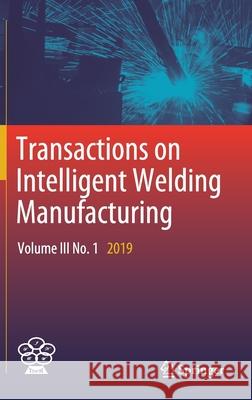Transactions on Intelligent Welding Manufacturing: Volume III No. 1 2019 » książka
topmenu
Transactions on Intelligent Welding Manufacturing: Volume III No. 1 2019
ISBN-13: 9789811381911 / Angielski / Twarda / 2020 / 167 str.
Transactions on Intelligent Welding Manufacturing: Volume III No. 1 2019
ISBN-13: 9789811381911 / Angielski / Twarda / 2020 / 167 str.
cena 603,81
(netto: 575,06 VAT: 5%)
Najniższa cena z 30 dni: 578,30
(netto: 575,06 VAT: 5%)
Najniższa cena z 30 dni: 578,30
Termin realizacji zamówienia:
ok. 16-18 dni roboczych.
ok. 16-18 dni roboczych.
Darmowa dostawa!
Volume III No. 1 2019











